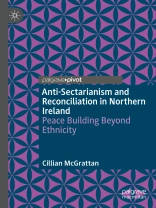This book addresses the limitations of dominant ways of thinking about and doing politics in Northern Ireland. Arguing for the foregrounding of anti-sectarianism as a way of displacing the divisive dynamics of religion and nationalism, it provides a new lens for studying Northern Ireland. Drawing upon a close reading of the political philosophy of Jacques Rancière, the book aligns anti-sectarianism to the ways that people refuse affiliation with the traditional ethnic values and practices. It describes this refusal as dis-identification, and reveals how dissensus acts as an alternative to the displacing of equality. Returning equality and equality claims-making to a clear position of visibility, the book provides a radical rethinking of Northern Ireland a quarter century beyond the 1998 peace accord. It will appeal to all those interested in politics and peacebuilding studies.
Innehållsförteckning
1. Introduction.- 2. Recognizing the Two Communities.- 3. Reconciling the Two Communities.- 4. Contesting the Two Communities.- 5. Conclusion.
Om författaren
Cillian Mc Grattan is Lecturer in Politics at Ulster University, UK. He is the author of Northern Ireland, 1968-2008 (2010), and The Politics of Trauma and Peacebuilding (2017). His book The Northern Ireland Conflict on the Margins of History: Protestant Memory on the Irish Border (with Ken Funston) is forthcoming.












